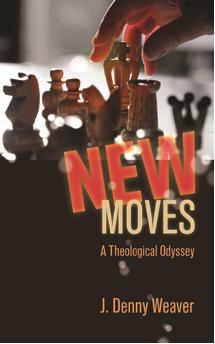|
 |
||||||||
|
|
Cascadia home | ||||||||
Reviews: In his in-depth, four-page Mennonite Quarterly review of New Moves, Gerald W. Schlabach says that "much of the drama, if not the pathos, of New Moves comes from Weaver finding himself a prophet unrecognized in his own Mennonite house yet vindicated by others. His key move (which he helpfully summarizes in a theological excursus at the end of his introduction) was to name and reject the way that Anselm’satonement theory underwrites violence. . . . “There is a lesson here for readers who find themselves convinced by some but not quite all of Weaver’s arguments. It may even be a lesson that need not provoke dogged countermoves from Weaver. For intriguingly, despite all of his opposition to the fourth-century Constantinian settlement by which Christian leaders accepted state-backed violence, his memoir reports almost no direct disputes with Catholics.” —Gerald W. Schlabach, reviewing in Mennonite Quarterly Review "I appreciate Weaver’s willingness to risk conflicts with his fellow Mennonites as he has sought to pursue his vision for peace theology. One would not expect a memoir to reflect on the excesses of the author’s own pugnaciousness. And we don’t get that in New Moves, though there is a brief, unrepentant acknowledgment of this dynamic on page 227. But we do get the sense that peace theology according to Weaver can be confrontive and countercultural." —Ted Grimsrud, "A Peaceful Yet Pugnacious Theologian," reviewing in Anabaptist World Summary (also available through PDF flier): Drew G. I. Hart, who teaches at Messiah University, has said that Weaver's memoir is "A must-read for the pews and the classroom that ultimately should lead us to the streets.” Written for lay readers as well as interested theologians, this memoir displays how a theological career develops and a new theological doctrine emerges. New Moves reveals the author’s wandering path from Mennonite Sunday school boy to the author of a trend-setting work of atonement theology that attracted praise and hostility. Writings as varied as the war memoirs of Charles de Gaulle and works by black, womanist, and feminist theologians both altered the author’s career arc and made major contributions to his theological perspectives. The author’s key theological move was to reject and then pose an alternative to the satisfaction atonement image. Since its articulation by Anselm of Canterbury, this image has been a dominant atonement motif among Christian traditions for nearly 900 years. Integral to the discussion of the career arc is New Move’s development of this new atonement image. The author’s initial efforts were attempts to develop an image that would reflect the commitment to nonviolence of his inherited Mennonite tradition. However, the encounter with Black Theology made clear that the issues concerned all Christians and revolved around Jesus’ rejection of the sword. The result has found acceptance in ecumenical circles as well as his Mennonite tradition. A bonus of this memoir is that through it readers will also gain an overview of the elements of the author’s systematic theology for all Christians. “Sometime amid the nine courses I took with J. Denny Weaver at Bluffton University, I commented to him that I wished I could be rebaptized, since I had come to understand my faith in a much deeper way than I had as a 14-year-old. His response: 'Your faith is supposed to keep growing and changing. That’s the whole point!' In this memoir, Weaver examines the experiences, encounters, reading, and even rebukes that shaped and reshaped his theology throughout his life. He also tracks the development of his vocation as a teacher and writer. Here we gain appreciation for a faith that continues to grow and deepen in conversation with both critics and admirers.” —Janeen Bertsche Johnson, Director of Campus Ministries, Admissions and Development Associate, Alumni Director, Anabaptist Mennonite Biblical Seminary “Forever the teacher, Denny Weaver invites readers to journey with him through his theo-biography, introducing readers to the people and events that both reinforced and expanded his understanding of God’s nonviolent mission in the world, most fully embodied in the life, death, and resurrection of Jesus. Weaver’s engaging, story-telling approach draws readers to reflect on their own faith-shaping experiences. This memoir is a gift to anyone who has ever wondered, ‘Why do I believe what I believe?’” —Doug Luginbill, Conference Minister, Central District Conference, Mennonite Church USA “Once again, J. Denny Weaver persuasively invites us to move away from Christendom abstractions and to allow our theology to emerge out of the concrete story of Jesus. This provocative and vulnerable theological journey takes us from Weaver’s White Mennonite upbringing to unexpected dialogue partners (some more gracious than others). Weaver walks with us, step by step, toward his path of articulating a nonviolent atonement informed by Black, Feminist, and Womanist theologies. And thankfully, after we have journeyed with him, our eyes become more attuned to the Jesus who (as Weaver reminds us) actively confronted the powers, and was victorious. Truly good news to ‘the least’, ‘the last’, and ‘little ones.' A must-read for the pews and the classroom that ultimately should lead us to the streets.” —Drew G. I. Hart, Associate Professor, Messiah University, Author, Who Will Be A Witness? Igniting Activism for God’s Justice, Love, and Deliverance Market: Anyone interested in a theological memoir explaining how J. Denny Weaver’s career as a theologian developed and led to his shaping a nonviolent understanding of Jesus’ Atonement. Shelving:
Memoir—theological;
autobiography—Mennonite/Anabaptist; Theology—Mennonite/Anabaptist, of
nonviolence; BISAC: Autobiography; History, Religion. RTM: 170
Autobiography; 690 Religion/Ethics. Publisher: Cascadia
Publishing House LLC |
|||||||||
|
|
|||||||||





